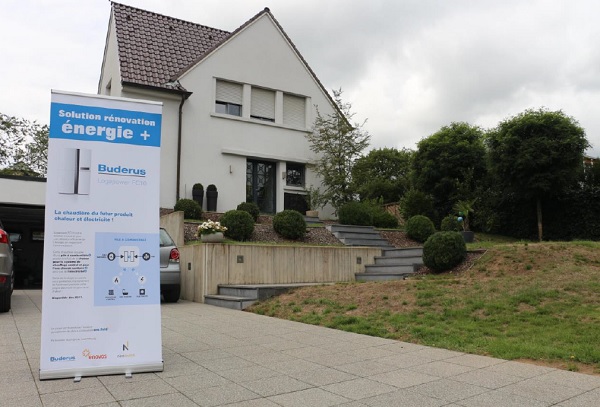
By signing the Kyoto Protocol, Luxembourg pledged to integrate 11% renewable energy in its total energy consumption by 2020; the objective of lowering the rate by 28% is taking shape thanks to many experiments related to biomass and photovoltaics - the focus is on finding another alternative to meet such obligations.
Buderus, Enovos and Neobuild have joined together to develop a pilot project on fuel cells (batteries), one that is innovative and progressive that allows efficient use of energy responsibly towards the environment.
Electricity generation heating systems contain an innovative ceramic fuel cell that supplies electricity by consuming natural gas and oxygen. This promising technology exists today in prototype form with two pilot plants in Luxembourg.
To promote it, Buderus, Enovos and Neobuild have partnered to develop two fuel cells in the Grand Duchy. Convinced that they are part of distributed generation systems of tomorrow, the consortium has a mission to install these systems in a single family home and in a large company. This pilot project aims to follow the technical operation of the fuel cell to the grid and measure carefully all elements of the production of energy in order to realise a real comparison with other conventional solutions. If the results of this study - which should last circa 2 years - are successful, the three consortium partners intend to actively promote this solution for heating and electricity production in Luxembourg.
Already used in Japan since the Fukushima disaster, this alternative solution must be set up in Europe by 2020 in response to the European "Energy House Plus" and in the European Ene.field project.
The objective of the European Commission is to promote the development of products to replace gas boilers. Current solutions do not adapt to all types of home: a heat pump can not be installed in an old building, and a wind turbine has no place in a city centre...
It should allow individual or two-family houses to be heated, but also produce their own energy consumption as well as photovoltaics.
The 5 main advantages of the system are:
- Maximum energy efficiency
- Quiet operation
- Integrated components that make the system compact
- A simple and adaptable system for rehabilitation and new construction
- Better protection of the environment
Logapower and its cogeneration system (heat and electricity) adapts to all types of public and private housing, it allows to move towards self-consumption while preserving the environment.
After 6 months of operation, the first results of the pilot project in a house Bridel were analysed. The first results of a new generation heating system were shown to be as follows:
- The Production / consumption values are good: The battery produces 2,700 kWh out of the 3,200 kWh needed to run the house.
- The efficiency of the heat production: need electricity to gas> 42% efficiency of power generation with help of the gas is 10% more than with a turbine in a factory for example
- 10 year warranty of electricity production without fear of power loss
- No malfunction was detected during the study period
- The electricity base load in the fuel cell offers advantages over a photovoltaic system, as this generates even in the absence of sunlight.
- The balance between production and consumption is better than with a photovoltaic installation. There is a constancy in electricity production (664 W average)
- A modern installation and design that does not clutter any room or the cellar
The launch of fuel cells on the Luxembourg market is expected after the completion of the demonstration project in 2017.








